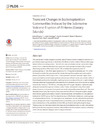Please use this identifier to cite or link to this item:
https://accedacris.ulpgc.es/jspui/handle/10553/12850
| Title: | Transient Changes in Bacterioplankton Communities Induced by the Submarine Volcanic Eruption of El Hierro (Canary Islands) | Authors: | Ferrera, Isabel Arístegui, Javier González, José M. Montero, María F. Fraile Nuez, Eugenio Gasol, Josep M. |
UNESCO Clasification: | 251001 Oceanografía biológica | Keywords: | Hydrothermal Vent Deposits 16S Ribosomal-Rna Bacterial Diversity Spatial-Patterns High-Throughput, et al |
Issue Date: | 2015 | Journal: | PLoS ONE | Abstract: | The submarine volcanic eruption occurring near El Hierro (Canary Islands) in October 2011 provided a unique opportunity to determine the effects of such events on the microbial populations of the surrounding waters. The birth of a new underwater volcano produced a large plume of vent material detectable from space that led to abrupt changes in the physicalchemical properties of the water column. We combined flow cytometry and 454- pyrosequencing of 16S rRNA gene amplicons (V1–V3 regions for Bacteria and V3–V5 for Archaea) to monitor the area around the volcano through the eruptive and post-eruptive phases (November 2011 to April 2012). Flow cytometric analyses revealed higher abundance and relative activity (expressed as a percentage of high-nucleic acid content cells) of heterotrophic prokaryotes during the eruptive process as compared to post-eruptive stages. Changes observed in populations detectable by flow cytometry were more evident at depths closer to the volcano (~70–200 m), coinciding also with oxygen depletion. Alpha-diversity analyses revealed that species richness (Chao1 index) decreased during the eruptive phase; however, no dramatic changes in community composition were observed. The most abundant taxa during the eruptive phase were similar to those in the post-eruptive stages and to those typically prevalent in oceanic bacterioplankton communities (i.e. the alphaproteobacterial SAR11 group, the Flavobacteriia class of the Bacteroidetes and certain groups of Gammaproteobacteria). Yet, although at low abundance, we also detected the presence of taxa not typically found in bacterioplankton communities such as the Epsilonproteobacteria and members of the candidate division ZB3, particularly during the eruptive stage. These groups are often associated with deep-sea hydrothermal vents or sulfur-rich springs. Both cytometric and sequence analyses showed that once the eruption ceased, evidences of the volcano-induced changes were no longer observed. | URI: | https://accedacris.ulpgc.es/handle/10553/12850 | ISSN: | 1932-6203 | DOI: | 10.1371/journal.pone.0118136 | Source: | PLoS ONE [ISSN 1932-6203], v. 10 (e0118136), (Febrero 2015) | Rights: | by-nc-nd |
| Appears in Collections: | Artículos |
SCOPUSTM
Citations
19
checked on Jun 8, 2025
WEB OF SCIENCETM
Citations
21
checked on Feb 1, 2026
Page view(s) 5
80
checked on Jan 11, 2026
Download(s)
92
checked on Jan 11, 2026
Google ScholarTM
Check
Altmetric
Share
Export metadata
Items in accedaCRIS are protected by copyright, with all rights reserved, unless otherwise indicated.
